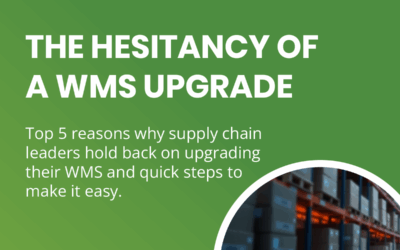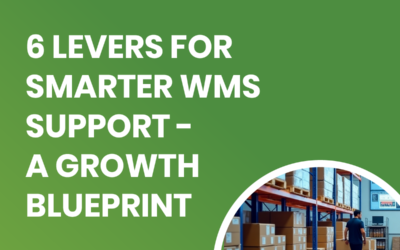TRYON BLOG
5 Ways to Uncomplicate the 3PL Industry

The Known:
All modern 3PL (third party logistics) operators should offer a comprehensive range of logistics and supply chain services. This includes leveraging advanced technologies and innovative solutions to meet the needs of their customers. They are also responsible for helping their customers streamline distribution processes, reduce costs and improve efficiency. Seems easy…and uncomplicated…right? Ummmmm..
The Complicated:
What is complicated….is just that. There are many complexities due to the dynamic nature of the logistics industry. This can include:
- Operational Complexity – being able to manage the diverse range of logistics services includes warehousing, transportation, inventory management and order management. Coordinating these operations efficiently while ensuring accuracy, timeliness and costs require robust processes, technology infrastructure and skilled personnel.
- Client Expectations – 3PL companies must meet the ever-changing needs and expectations of their clients, who often demand customized solutions, flexible services and superior performance. Balancing competing client priorities, managing service levels agreements (SLAs) and maintaining client satisfaction can be challenging, particularly in a competitive market where differentiation is crucial.
- Supply Chain Disruptions – 3PL companies are susceptible to supply chain disruptions such as natural disasters, geographical events, labor strikes and transportation delays, which can impact service levels and operational continuity. Mitigating these risks requires effective risk management strategies, contingency planning and resilient supply chain practices.
- Regulatory Compliance – 3PLs must navigate a complex landscape of regulatory requirements and compliance standards related to transportation, warehousing, customs and trade regulations. Ensuring compliance with applicable laws and regulations, obtaining necessary permits and licenses, and staying updated on these changes can pose challenges, especially in international operations.
- Talent Management – Recruiting, training and retailing skilled personnel is a crucial challenge as well. 3PL operators require a diverse range of expertise, including warehouse management, transportation planning, inventory control and customer service. Competition for talent, high turnover rates and skill shortages in certain areas can hinder your workforce and impact performance.
- Cost Pressures – 3PLs face pressure to reduce costs while maintaining service quality and profitability as most clients are seeking competitive pricing and cost-effective solutions. Managing operating expenses, optimizing resource utilization and negotiating favorable contracts with suppliers and service providers are essential for maintaining financial sustainability.
More Complicated:
Wait! There’s more?? Yes, It comes from the unique requirements of each client. 3PLs should offer robust client segmentation capabilities, allowing customization of workflows, inventory management rules, billing structures, and reporting formats based on individual client needs.
- Client Segmentation and Customization – 3PL’s typically serve multiple clients, each with unique requirements and preferences. Then, each client might have some sort of value-added-service (VAS) to add to those complications.
- Multi-Tenants – Since most 3PLs host multiple clients simultaneously, you will have multiple levels of service…which include different SLAs, timeframes, labor needs, etc. now multiply that by the number of clients.
- Billing and Revenue Management – Billing in the 3PL industry can be complex, involving various pricing models such as storage fees, handling charges, order fulfillment fees, and value-added services. This list could go on and on..
Integration and Connectivity – 3PLs often interact with a wide range of systems and stakeholders, including clients, carriers, suppliers, and trading partners. From a systems perspective, this includes ERPs, financial tools, eCommerce tools, TMS, LMS, EDI, etc, etc.
Now to Uncomplicate:
Yes, there are easier ways to do things. There are answers and solutions to each line item above. But wouldn’t it be easier to take care of these all together? Using a warehouse management system (WMS) is solution #1. WMS platforms have grown up quite a bit…even from 5 years ago. Great WMS platforms should be able to handle these complexities and help make your 3PL run smoothly:
- Warehouse software for 3PLs should offer robust client segmentation capabilities, allowing customization of workflows, inventory management rules, billing structures, and reporting formats. This ensures that each client receives tailored services and maintains visibility and control over their inventory and operations within the shared warehouse environment.
- Since 3PL warehouses host inventory from multiple clients, the software needs to support multi-tenancy architecture. This enables secure isolation of data and operations for each client while allowing centralized management and oversight by the 3PL. Multi-tenancy support ensures data integrity, confidentiality, and compliance with regulatory requirements, while also facilitating efficient resource utilization and scalability across the warehouse network.
- Warehouse software for 3PLs should offer robust billing and revenue management functionalities, allowing accurate and automated calculation of charges based on client contracts, service agreements, and usage metrics. This includes features such as flexible pricing configuration, automated invoicing, billing reconciliation, and revenue reporting to streamline financial processes and ensure billing accuracy and transparency for both the 3PL and its clients.
- Integration and connectivity enables data exchange, process automation, and real-time visibility across the supply chain ecosystem, facilitating collaboration, agility, and responsiveness to changing customer demands and market dynamics.
Lastly, we have found that most successful 3PLs also operate with systems consultants. These are groups that specialize in supply chain and logistics systems that allow you to focus on customer success and streamlining those operations. These systems consultants will keep your WMS, TMS, LMS and OMS tools up to date and working seamlessly with other connections and integrations. With 3PL clients and the different SLAs in play, it’s nice to have a crew that not only understand your systems, but can bring leading practices and modern technologies to the forefront. These modern 3PLs use these systems, automation and processes as a differentiator.

Written By Jeff Constable
As a seasoned sales leader, Jeff Constable has a proven track record of driving revenue growth and building high-performing teams in the supply chain industry. For further information, please email sales@tryonsolutions.com.
More From This Category
5 Supply Chain Software Updates for Compliance
The regulatory landscape for pharma and medical device companies is shifting faster than ever. With the DSCSA now fully enforced, FDA PreCheck requirements rolling out, and new AI regulations emerging, your supply chain software needs to keep pace. For many...
The Hesitancy of a WMS Upgrade
Top 5 reasons why supply chain leaders hold back on upgrading their WMS and quick steps to make it easy. Upgrading a WMS is one of the most impactful decisions supply chain leaders can make. A modern WMS brings greater efficiency, automation and visibility - yet many...
6 Levers for Smarter WMS Support
Whether you're juggling school drop-offs, remembering a birthday party, or trying to reply to that one group text before dinner hits the table, modern life pulls us in a hundred directions at once. That constant pressure to keep up, stay flexible, and deliver—no...



